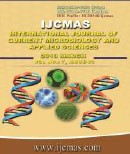


 National Academy of Agricultural Sciences (NAAS)
National Academy of Agricultural Sciences (NAAS)

|
PRINT ISSN : 2319-7692
Online ISSN : 2319-7706 Issues : 12 per year Publisher : Excellent Publishers Email : editorijcmas@gmail.com / submit@ijcmas.com Editor-in-chief: Dr.M.Prakash Index Copernicus ICV 2018: 95.39 NAAS RATING 2020: 5.38 |
Fungal pathogen F. oxysporum (Schlecht.) f. sp. phaseoli Kendrick and Synder was isolated from the infected roots of bean plants. Microscopic examination revealed that the mycelium was septate which produced microconidia and macroconidia. The pathogen was accordingly identified after comparing with that of the standard texts. A total number of 24 rhizobacterial were isolated from the rhizosphere of different crops. Morphological studies revealed that out of 24 rhizobacterial isolates 9 showed light green, 2 green, 8 cream, 4 white and 1 red colour, 12 were round, non-spreading type whereas, 12 were irregular and spreading type colonies. Among all the rhizobacterial strains, 14 strains showed Gram -ve reaction, whereas, 10 rhizobacterial strains showed Gram +ve reaction. Out of the 24 isolates, 17 were small rods, whereas, 7 isolates were large rods. Under in vitro conditions, among 24 isolates 5 exhibited potential of acting as biocontrol agents in which isolate I-5 exhibited minimum radial growth (28.00 mm), resulting in inhibition of by 68.89 % over control followed by isolate I-21 recorded radial growth of 29.63 mm, thereby inhibiting the growth of pathogen by 67.08 % over control. Among all the five selected PGPR isolates and carbendazim treated with beans seed showed minimum disease incidence and disease intensity compared to control. The seed treatment with carbendazim recorded minimum disease incidence (3.12%) and disease intensity (0.83%), followed by seed treatment with Stenotrophomonas maltophilia recorded minimum disease incidence (4.86 %) and disease intensity (1.39 %) respectively.
 |
 |
 |
 |
 |